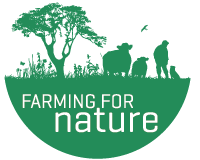Ballyglisheen Commonage Community Group
Nomination:
The members of the Ballyglisheen Commonage Community Group (CCG) have been exemplary in their efforts to improve the ecological condition of their land. Since 2019, the commonage rights holders have come together to form a group dedicated to improving their upland heath commonage in the Blackstairs Mountains. This group not only works together to manage grazing and agricultural operations but has also carried out extensive restoration works such as stone wall repair and bracken control, all by hand. Their group has set an example of the benefits of cooperation for commonage holders throughout the country. In the three years they have been involved in the Blackstairs Farming Futures project, they have raised their score from a 6/10 to an 8/10, whilst improving the available grazing for their livestock. Ballyglisheen is primarily dry heath, with patches of wet heath on the southern extent. The heath is in good condition, with all stages of heather growth present throughout the site and is lightly grazed by sheep. The eastern edge forms the ridge of the southern extent of the Blackstairs Mountains and is mostly exposed rock and scree. Previous fires have led to the expansion of dense bracken through the site and had exacerbated the erosion of soils near the exposed rock. In 2019, the commonage holders agreed to a moratorium on fire management and have since established a firewatch for their area. This site has been nominated as a location to carry out small-scale controlled burn training for local farmers to reduce the threat of uncontrolled burns in this area. Their interest in conservation goes beyond biodiversity. The CCG have been keen to share their knowledge on the history and archaeology on Ballyglisheen. The site contains a variety of monuments and historical buildings, including the remains of an RIC barracks. The Ballyglisheen CCG have recognised the importance of both natural and cultural heritage and their role in conserving it for future generations.
Nominator: Thomas Gorman, Project Ecologist, Blackstairs Farming Futures EIP





